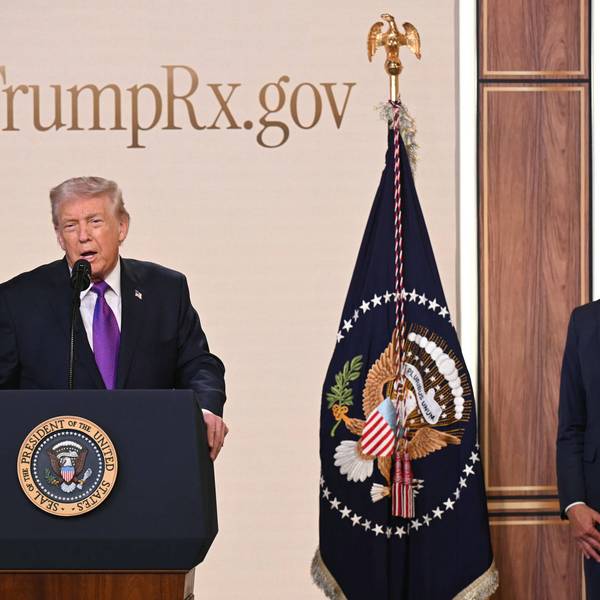
An Oklahoma judge ruled Monday that phramaceutical giant Johnson & Johnson is responsible for its role in perpetiuating the opioid crisis. (Photo: Cindy Shebley, Flickr, cc)
'About Damn Time': In First of Thousands of Lawsuits Against Big Pharma, Johnson & Johnson Ordered to Pay $572M for Flooding Oklahoma With Opioids
"The opioid crisis has ravaged the state of Oklahoma," a federal judge said Monday. "It must be abated immediately."
In the first decided case against a corporation accused of contributing to the opioid epidemic in the U.S., personal care and pharmaceutical giant Johnson & Johnson was ordered on Monday to pay $572 million in fines for its role in perpetuating the crisis.
Through contracts with poppy growers in Tasmania, the company supplied 60 percent of the ingredients that drug companies used in opioid painkillers like OxyContin, contributing to the deaths of about 400,000 Americans in the last two decades--including 388 Oklahoma residents just in 2017.
Opioid manufacturers are facing thousands of lawsuits across the country for aggressively marketing drugs like OxyContin, Vicodin, and Percocet as non-addictive and safe for long-term use for chronic pain--even though the drugs are chemically very similar to heroin.
Public health advocates applauded District Judge Thad Balkman for holding the company accountable for its role in flooding Oklahoma with enough opioids between 2006 and 2012 for every resident to have nearly 100 pills each annually in some areas.
"Johnson & Johnson executives made the calculated and coldblooded decision that they were going to produce a mutant strain of poppy, corner the market and supply massive amounts of the active ingredients for other companies to manufacture opioids," said Oklahoma Attorney General Mike Hunter, who brought the case against the company.
Three executives at Purdue Pharma, the maker of OxyContin, were found guilty in 2007 of misleading doctors, patients, and regulators about the addictive nature of the drug, and were ordered to pay $34.5 million in fines, in addition to $600 million paid by the company. But the lawsuit against Johnson & Johnson is the first of about 2,000 pending cases filed in cities and towns across the country where officials and residents want to hold opioid makers and marketers accountable for the damage they did to communities.
"The opioid crisis has ravaged the state of Oklahoma," Balkman said before announcing his verdict. "It must be abated immediately."
An Urgent Message From Our Co-Founder
Dear Common Dreams reader, The U.S. is on a fast track to authoritarianism like nothing I've ever seen. Meanwhile, corporate news outlets are utterly capitulating to Trump, twisting their coverage to avoid drawing his ire while lining up to stuff cash in his pockets. That's why I believe that Common Dreams is doing the best and most consequential reporting that we've ever done. Our small but mighty team is a progressive reporting powerhouse, covering the news every day that the corporate media never will. Our mission has always been simple: To inform. To inspire. And to ignite change for the common good. Now here's the key piece that I want all our readers to understand: None of this would be possible without your financial support. That's not just some fundraising cliche. It's the absolute and literal truth. We don't accept corporate advertising and never will. We don't have a paywall because we don't think people should be blocked from critical news based on their ability to pay. Everything we do is funded by the donations of readers like you. Will you donate now to help power the nonprofit, independent reporting of Common Dreams? Thank you for being a vital member of our community. Together, we can keep independent journalism alive when it’s needed most. - Craig Brown, Co-founder |
In the first decided case against a corporation accused of contributing to the opioid epidemic in the U.S., personal care and pharmaceutical giant Johnson & Johnson was ordered on Monday to pay $572 million in fines for its role in perpetuating the crisis.
Through contracts with poppy growers in Tasmania, the company supplied 60 percent of the ingredients that drug companies used in opioid painkillers like OxyContin, contributing to the deaths of about 400,000 Americans in the last two decades--including 388 Oklahoma residents just in 2017.
Opioid manufacturers are facing thousands of lawsuits across the country for aggressively marketing drugs like OxyContin, Vicodin, and Percocet as non-addictive and safe for long-term use for chronic pain--even though the drugs are chemically very similar to heroin.
Public health advocates applauded District Judge Thad Balkman for holding the company accountable for its role in flooding Oklahoma with enough opioids between 2006 and 2012 for every resident to have nearly 100 pills each annually in some areas.
"Johnson & Johnson executives made the calculated and coldblooded decision that they were going to produce a mutant strain of poppy, corner the market and supply massive amounts of the active ingredients for other companies to manufacture opioids," said Oklahoma Attorney General Mike Hunter, who brought the case against the company.
Three executives at Purdue Pharma, the maker of OxyContin, were found guilty in 2007 of misleading doctors, patients, and regulators about the addictive nature of the drug, and were ordered to pay $34.5 million in fines, in addition to $600 million paid by the company. But the lawsuit against Johnson & Johnson is the first of about 2,000 pending cases filed in cities and towns across the country where officials and residents want to hold opioid makers and marketers accountable for the damage they did to communities.
"The opioid crisis has ravaged the state of Oklahoma," Balkman said before announcing his verdict. "It must be abated immediately."
In the first decided case against a corporation accused of contributing to the opioid epidemic in the U.S., personal care and pharmaceutical giant Johnson & Johnson was ordered on Monday to pay $572 million in fines for its role in perpetuating the crisis.
Through contracts with poppy growers in Tasmania, the company supplied 60 percent of the ingredients that drug companies used in opioid painkillers like OxyContin, contributing to the deaths of about 400,000 Americans in the last two decades--including 388 Oklahoma residents just in 2017.
Opioid manufacturers are facing thousands of lawsuits across the country for aggressively marketing drugs like OxyContin, Vicodin, and Percocet as non-addictive and safe for long-term use for chronic pain--even though the drugs are chemically very similar to heroin.
Public health advocates applauded District Judge Thad Balkman for holding the company accountable for its role in flooding Oklahoma with enough opioids between 2006 and 2012 for every resident to have nearly 100 pills each annually in some areas.
"Johnson & Johnson executives made the calculated and coldblooded decision that they were going to produce a mutant strain of poppy, corner the market and supply massive amounts of the active ingredients for other companies to manufacture opioids," said Oklahoma Attorney General Mike Hunter, who brought the case against the company.
Three executives at Purdue Pharma, the maker of OxyContin, were found guilty in 2007 of misleading doctors, patients, and regulators about the addictive nature of the drug, and were ordered to pay $34.5 million in fines, in addition to $600 million paid by the company. But the lawsuit against Johnson & Johnson is the first of about 2,000 pending cases filed in cities and towns across the country where officials and residents want to hold opioid makers and marketers accountable for the damage they did to communities.
"The opioid crisis has ravaged the state of Oklahoma," Balkman said before announcing his verdict. "It must be abated immediately."

